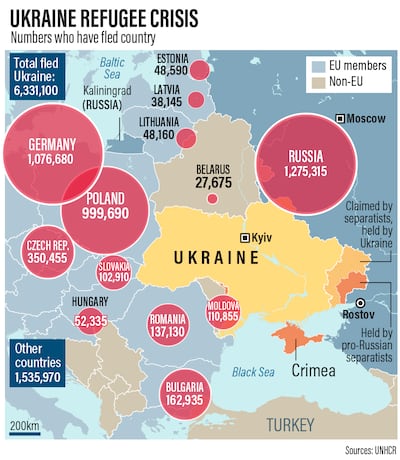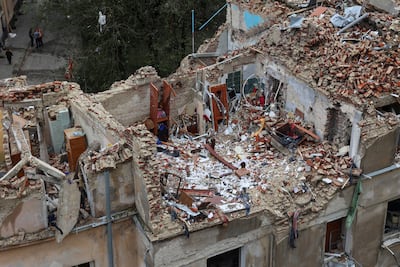Russia’s war in Ukraine reached its 500th day on Saturday with no end to the fighting in sight, leaving many evacuees wondering if they will ever return to their home country.
Millions of Ukrainians have been uprooted by the violence and forced to relocate either internally or to international havens.
Washington's plan to give cluster munitions to Kyiv is the latest sign that the fight does not look to be going in the Ukrainians' favour.
In an interview with CNN broadcast on Friday evening, President Joe Biden defended the “difficult” decision to send the weapons to Ukraine, but insisted “they needed them”.
Prime Minister Rishi Sunak on Saturday said Britain “discourages” the use of cluster munitions, highlighting that the UK was one of 123 signatories of a convention banning their use.
Ukraine's much-anticipated spring counter-offensive, which had been hailed by the American media as a turning point in the war, has so far failed to yield major advances.
President Volodymyr Zelenskyy on Saturday posted a video of himself visiting Snake Island, as the country marked the milestone of 500 days without peace.
The Black Sea island became a symbol of Ukrainian resistance after it was seized by Russia in the early days of the invasion but later reclaimed by forces loyal to Kyiv.
In the undated clip uploaded on Telegram, Mr Zelenskyy called the outpost a “place of victory” that would never fall back into Russian hands. He described Snake Island as proof that his country will regain every inch of its territory captured by Russia.
“I want to thank from here, from this place of victory, each of our soldiers for these 500 days,” Mr Zelenskyy said.
The video showed him arriving on the island by boat and placing a bouquet of blue and yellow flowers and a candle at a memorial.
The Zelenskyy administration continues to push for Nato membership ahead of the transatlantic alliance's summit in Lithuania next week.
The US has said Ukraine will be offered an enhanced “political relationship” with the union at a gathering, while playing down hopes it might soon become a full member.
With no end in sight for Russia's war on its neighbour, Ukrainian refugees are facing increased uncertainty about their futures.
European nations have absorbed the bulk of the refugees.
The six million people who are living abroad are beginning to think about settling for good in the countries they initially hoped would be temporary sanctuaries.
That could pose a challenge for rebuilding the economy when peace or a ceasefire comes.
For all sides – Ukraine, its western supporters and Russia – the stakes are rising.
Last month, a major dam in southern Ukraine collapsed, leaving death, destruction and long-term environmental damage in its wake.
Fears of a nuclear disaster increased this week when both sides accused each other of planning to attack one of the world’s largest atomic power plants.
Long-range missiles fired by Russia to deplete Ukraine's air defences have killed dozens of civilians.
Internally displaced people dream of returning home, but for those further afield, the lure could be a mirage.

Russia, which has a 1,974-kilometre border with Ukraine, became the route out of Ukraine for 1.27 million people. For those fleeing west, Germany took in the most, almost 1.1 million, followed by hundreds of thousands in Poland, the Czech Republic, the US and UK.
UNHCR studies show the vast majority of displaced Ukrainians want to return one day, but only about one in 10 plan to do so soon.
Natalka Korzh, a TV director, left behind a newly built home when she escaped the rockets falling on Kyiv in the early days of the war.
She is only now finding her feet in Portugal and does not plan on packing up her life again, even when fighting stops.
“I have to start from scratch,” she said. She now wants to open a charity in Portugal to help other migrants in the town of Lagoa, which she now calls home.
In previous refugee crises, for example in Syria, the desire to return home fades with time, UNHCR said.
Company managers in Ukraine are considering what type of workforce there will be.
Volodymyr Kostiuk, chief executive of Farmak, one of Ukraine's leading pharmaceutical companies, with nearly 3,000 employees and more than $200 million in revenue the year before the war, said with so many people abroad, displaced or drafted into the military, there is a shortage in qualified laboratory workers and production specialists.

“We need to somehow try to return them to Ukraine, because we already see that the longer people are abroad, the less they want to return,” he said.
Anastasiya is among Ukraine's millions of internally displaced, having fled the southern city of Dnipro after a rocket attack.
“We heard a dull thud and I suddenly found myself in the window frame,” she said.
“As I remember, all I thought at that moment was to see my son, and I ran headlong from the fifth floor to the ground to look for my son. And only then I realised that a rocket hit my house.
“Our hopes are to come back to our apartment, rebuild the house, so that children again could loudly play in the yard and we could hear their laughs; that skies are blue and peaceful.”
A poll of about 500 businesses in Ukraine carried out by Ukrainian think tank the Institute for Economic Research and Political Studies showed that a third reported staff shortages as a major challenge.
Conscription-age men are restricted from leaving Ukraine, so children and working-aged women make up most of the refugees.
Labour shortages have been a problem for industries that require staff with higher levels of education and training because educated young women are among those most likely to have left the country since the war started in February 2022.
Two thirds of the women who sought refuge across Europe have a higher education, according to the Ukrainian Centre for Economic Strategy think tank.
































